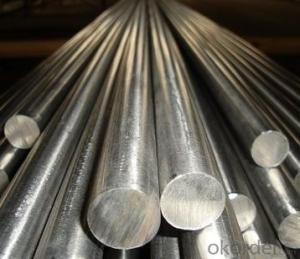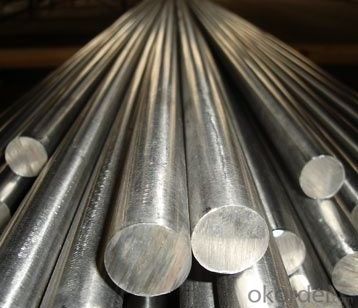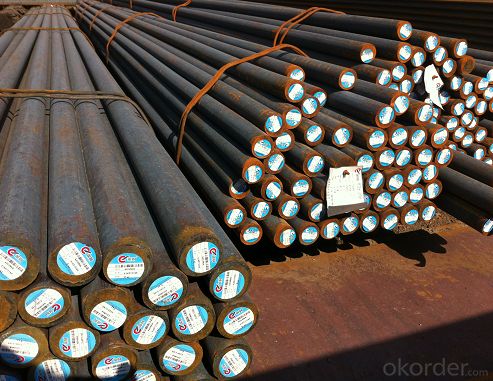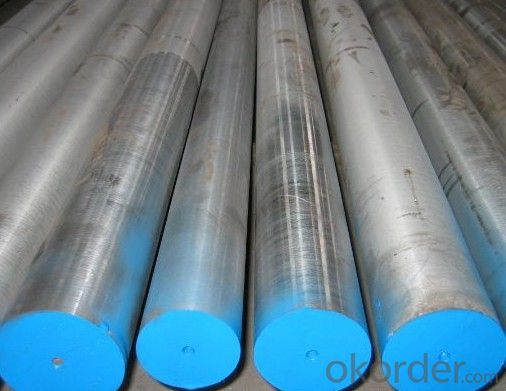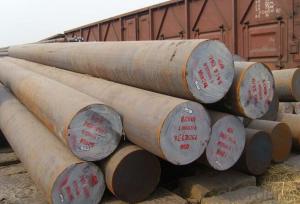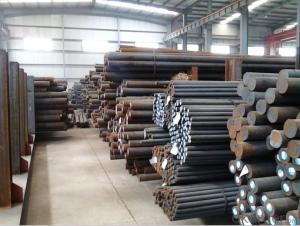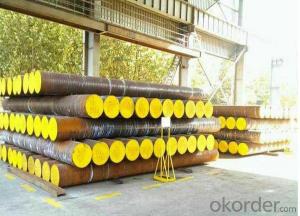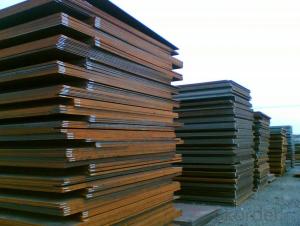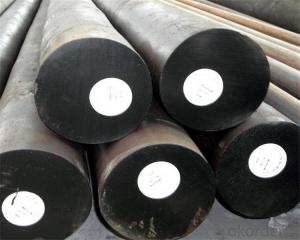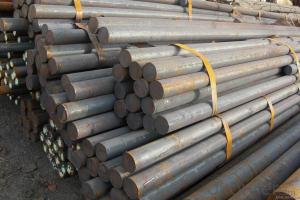Alloy Steel ASTM D2 Special Steel Carbon Steel
- Loading Port:
- China main port
- Payment Terms:
- TT OR LC
- Min Order Qty:
- 25 m.t.
- Supply Capability:
- 10000 m.t./month
OKorder Service Pledge
OKorder Financial Service
You Might Also Like
Specification
Chemical Composition(%)
| Country | Standard | C | Si | Mn | Cr | Mo | V | S | P | Other |
| China(GB) | Cr12Mo1V1 | 1.40-1.60 | ≤0.60 | ≤0.60 | 11.0-13.0 | 0.70-1.20 | ≤1.10 | ≤0.030 | ≤0.030 | Co≤1.00 |
| USA(ASTM) | D2 | 1.40-1.60 | 0.30-0.50 | 0.30-0.50 | 11.0-13.0 | 0.70-1.20 | 0.8 | ≤0.025 | ≤0.025 | Co:0.60 |
| Germany(DIN) | 1.2379 | 1.50-1.60 | 0.10-0.40 | 0.15-0.45 | 11.5-12.5 | 0.60-0.80 | 0.90-1.10 | ≤0.030 | ≤0.030 | - |
| Japan(JIS) | SKD11 | 1.40-1.60 | ≤0.40 | ≤0.60 | 11.0-13.0 | 0.80-1.20 | 0.20-0.50 | - | - | Ni≤0.50 |
Available Size
| Rolled flat steel | 12-90mm×205-610mm×L |
| Forged flat steel | 100-300mm×400-600mm×L |
Characterstics
| 1.High hardening ability and quench-hardening performance | ||||||
| 2.High abrasive resistance | ||||||
| 3.Good oxidation resistance at elevated temperatures | ||||||
| 4.Less deformation after heat treatment |
Applications: suitable for various complicated cold working dies with high precision and long lifetime,such as punching dies,cold extrusion dies,thread rolling dies,screw plates,cold extrusion dies,and precise measuring devices


1, Your advantages?
professional products inquiry, products knowledge train (for agents), smooth goods delivery, excellent customer solution proposale
2, Test & Certificate?
SGS test is available, customer inspection before shipping is welcome, third party inspection is no problem
3, Payment Terms?
30% TT as deposit and 70% before delivery.
Irrevocable L/C at sight.
4, Trading Terms?
EXW, FOB, CIF, FFR, CNF
6, After-sale Service?
We provides the services and support you need for every step of our cooperation. We're the business partner you can trust.
For any problem, please kindly contact us at any your convenient time.
We'll reply you in our first priority within 24 hours.
- Q: Can special steel be used in the production of gears?
- Yes, special steel can be used in the production of gears. Special steels are often preferred for gear manufacturing due to their high strength, durability, and wear resistance properties. They can withstand heavy loads, high temperatures, and provide excellent performance in various industries such as automotive, aerospace, and machinery.
- Q: What are the applications of special steel in the agriculture supply chain?
- Special steel has several applications in the agriculture supply chain. It is commonly used in the manufacturing of farm equipment and machinery such as tractors, plows, and harvesters. Special steel's high strength and durability make it ideal for these heavy-duty applications, ensuring that the equipment can withstand the demanding conditions of the agricultural sector. Additionally, special steel is also used in the production of storage tanks and silos, providing a robust and reliable solution for storing grains, fertilizers, and other agricultural products.
- Q: How is special steel heat treated?
- Special steel is heat treated using a combination of heating and cooling processes to improve its strength, hardness, and other desired properties. This typically involves heating the steel to a specific temperature, known as the austenitizing temperature, followed by rapid cooling, known as quenching, to transform the steel's microstructure. This is then followed by tempering, where the steel is reheated to a lower temperature to relieve internal stresses and further enhance its mechanical properties. The specific heat treatment process and parameters vary depending on the type of special steel and the desired final properties.
- Q: What are the main advantages of using special steel in the marine industry?
- The main advantages of using special steel in the marine industry are its high strength and durability, corrosion resistance, and ability to withstand extreme conditions. Special steel provides the necessary structural integrity to withstand the harsh marine environment, including exposure to saltwater, waves, and impact forces. It also offers excellent resistance to corrosion, which is crucial for maintaining the integrity and longevity of marine structures. Moreover, special steel's ability to withstand extreme temperatures and pressures makes it suitable for various marine applications, such as shipbuilding, offshore structures, and marine equipment.
- Q: Can special steel be used in the transportation industry?
- Yes, special steel can be used in the transportation industry. Special steel alloys, such as stainless steel and high-strength steel, offer superior strength, corrosion resistance, and durability, making them suitable for various applications in transportation. These steels are commonly used in the production of automotive components, aircraft parts, railway infrastructure, and ships, enhancing safety and performance in the transportation sector.
- Q: What are the different methods of surface thermal spraying for special steel?
- There are various techniques available for surface thermal spraying on special steel. These techniques consist of: 1. Flame spraying: This method involves melting the coating material using a flame or oxy-fuel source, and then spraying it onto the special steel surface. It is commonly utilized for applying coatings like zinc, aluminum, or their alloys. 2. Arc spraying: In arc spraying, the coating material is melted using an electric arc and then propelled onto the special steel surface using compressed air. This technique is often employed for applying coatings such as stainless steel, nickel alloys, or copper. 3. Plasma spraying: Plasma spraying employs a plasma torch to heat and melt the coating material, which is then propelled onto the special steel surface. It is especially effective for applying coatings with high melting points like ceramic or metallic materials. 4. High-velocity oxy-fuel (HVOF) spraying: HVOF spraying uses a high-pressure combustion process to propel the coating material onto the special steel surface. This technique produces coatings with high bond strength and density, making it suitable for applications that require wear resistance or corrosion protection. 5. Detonation spraying: Detonation spraying involves a controlled detonation process to accelerate the coating material onto the special steel surface. It is often used for applying coatings such as tungsten carbide or other hard materials, providing excellent wear resistance. Each of these surface thermal spraying methods offers unique advantages and is chosen based on the specific requirements of the special steel application, including the desired coating material, thickness, and performance characteristics.
- Q: What is the composition of special steel?
- Special steel is a type of steel that is alloyed with various elements to enhance its specific properties, such as increased strength, corrosion resistance, or heat resistance. The composition of special steel can vary depending on the desired characteristics, but it commonly includes elements like chromium, nickel, molybdenum, vanadium, and tungsten, among others. These alloying elements contribute to the unique properties and performance of special steel in various industries, including automotive, aerospace, and construction.
- Q: How does special steel contribute to the defense aerospace industry?
- Special steel plays a critical role in the defense aerospace industry by providing the necessary strength, durability, and resistance to extreme conditions that are essential for the design and production of military aircraft and defense systems. One of the key contributions of special steel is its ability to withstand high temperatures and pressures, making it suitable for the construction of engine components such as turbine blades, exhaust systems, and combustion chambers. These parts are subjected to intense heat and stress during operation, and special steel ensures they can withstand these extreme conditions without compromising performance or safety. Furthermore, special steel is utilized in the manufacturing of structural components in military aircraft, such as landing gear, wings, and fuselage sections. These components need to possess exceptional strength and toughness to withstand the harsh conditions encountered during flight and combat operations. Special steel provides the necessary mechanical properties to ensure these components can withstand the forces and impacts they may experience. Another crucial aspect where special steel contributes to the defense aerospace industry is its corrosion resistance. Military aircraft are often exposed to harsh environments, including saltwater and corrosive chemicals. Special steel, through the addition of corrosion-resistant alloys, helps protect critical parts from corrosion, ensuring the longevity and reliability of the aircraft. Moreover, special steel's high strength-to-weight ratio allows for the production of lightweight yet robust components in defense aerospace applications. This characteristic is highly desirable in the aerospace industry as it enables the design of aircraft that are more fuel-efficient, faster, and capable of carrying higher payloads. By reducing weight, special steel contributes to the overall performance and efficiency of military aircraft. In conclusion, special steel is an indispensable material in the defense aerospace industry. Its unique properties, such as high temperature resistance, strength, corrosion resistance, and lightweight characteristics, enable the production of reliable, high-performance military aircraft and defense systems. Special steel plays a crucial role in ensuring the safety, efficiency, and effectiveness of the defense aerospace industry.
- Q: What are the different casting techniques used for special steel?
- There are several casting techniques used for special steel, including investment casting, continuous casting, sand casting, and centrifugal casting. These techniques allow for the production of complex shapes, improved surface finish, and precise control over the metallurgical properties of the steel. Each technique has its advantages and is used depending on the specific requirements of the final product.
- Q: How does the demand for special steel vary across different regions?
- The demand for special steel can vary significantly across different regions due to several factors. One of the key drivers of demand variation is the level of industrialization in a particular region. Developed regions with a strong manufacturing sector, such as North America, Europe, and East Asia, tend to have a higher demand for special steel as they rely heavily on it for various industrial applications. Another factor that influences demand variation is the presence of specific industries or sectors within a region. For example, regions with a significant automotive or aerospace industry will have a higher demand for special steel as these sectors require high-performance materials for the production of vehicles or aircraft. Moreover, the construction industry plays a crucial role in determining the demand for special steel. Regions experiencing rapid urbanization and infrastructure development, like Southeast Asia, the Middle East, and parts of Africa, have an increased demand for special steel for the construction of buildings, bridges, and other infrastructure projects. Additionally, the availability of raw materials and production capabilities within a region can affect the demand for special steel. Regions with ample access to iron ore, coal, and other necessary resources for steel production may have a higher demand for special steel as they can efficiently produce it. Lastly, economic trends and government policies also impact the demand for special steel. Regions with stable economic growth and favorable policies for industries that use special steel will likely experience higher demand. Conversely, regions facing economic downturns or restrictive trade policies may witness a decline in demand. In conclusion, the demand for special steel varies across different regions due to factors such as industrialization levels, specific industries present, construction activities, availability of raw materials, and economic trends. Understanding these variations is essential for steel manufacturers and suppliers to effectively target and cater to the diverse needs of different regions.
Send your message to us
Alloy Steel ASTM D2 Special Steel Carbon Steel
- Loading Port:
- China main port
- Payment Terms:
- TT OR LC
- Min Order Qty:
- 25 m.t.
- Supply Capability:
- 10000 m.t./month
OKorder Service Pledge
OKorder Financial Service
Similar products
Hot products
Hot Searches
Related keywords
